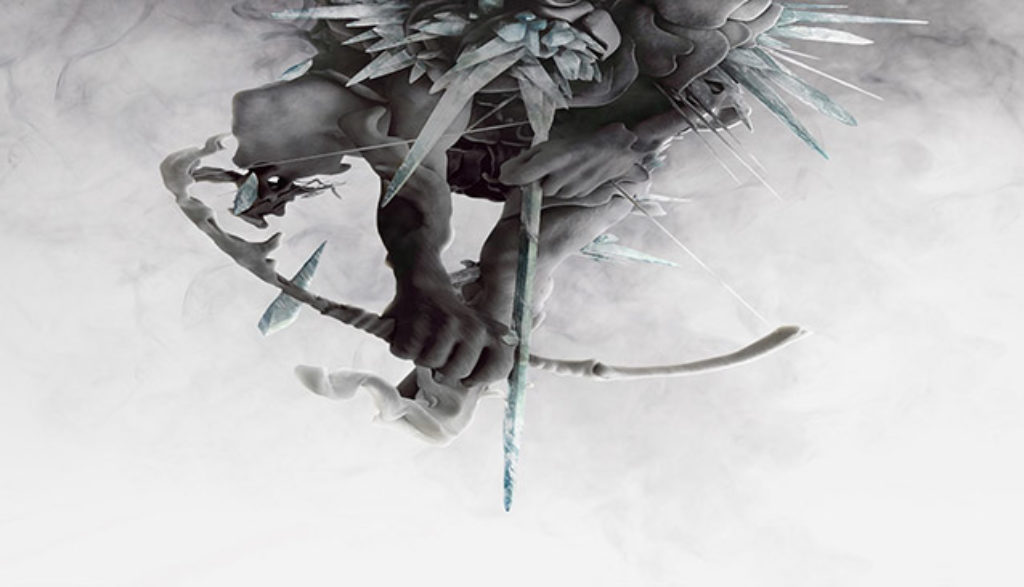
Linkin Park co-frontman Chester Bennington wastes no time telling us exactly how he feels in the first lines of The Hunting Party’s opening song, “Keys to the Kingdom”: “No control, no surprise/Throw the keys to the kingdom down that hole in my eye/I’m my own casualty/I f— up everything I see, fighting in futility.”
While Bennington has never been a poster child for optimism and sunshine, rays of hope and a healthier perspective on suffering have at times peeked through the fog on Linkin Park’s last couple of albums. Now the soupy despair seems thicker, and the warming rays of light thinner. Even what might be initially characterized as a positive perspective more often than not comes from a place of loss, confusion and deep melancholy.
Throughout The Hunting Party, Linkin Park fixates obsessively on conflict, death and injustice, only rarely suggesting that there might be meaning or hope on the other side of the violent warfare—whether literal or metaphorical—that many of these songs explore.
“Guilty All the Same” is full of rage, to be sure, but it points out the fact that hypocritical moralizing helps no one (“Tell us all again/What you think we should be/What the answers are/What it is we can’t see/ … Show us all again/That our hands are unclean/ … You’re guilty all the same/Too sick to be ashamed/You want to point your finger/But there’s no one else to blame”). A bit later, guest contributor Rakim denounces corporate greed, singing, “Even corporate hands is filthy/ … All they think about is bank accounts, assets and realty/At anybody’s expense/No shame with a clear conscience.”
“War” rightly recognizes that armed aggression destroys lives. “Wastelands” laments our culture’s lack of integrity. “Until It’s Gone” repeats the old cliché, “I’ve heard it said a thousand times/But now I know/That you don’t know what you’ve got/ … Until it’s gone.” We also hear regret about failing to protect someone (“I thought I kept you safe and sound/I thought I made you strong/But something made me realize/That I was wrong”). “Rebellion” longs for cleansing and clarity, and painfully admits, “I can’t repair the damage done.”
Album closer “A Line in the Sand” insists that fraudulent oppressors will one day face justice …
… but many fans will hear it as both violent and vigilante (“Another day, your truth will come/You’re gonna pay for what you/Pay for what you’ve done/You’ll get what’s yours/And face your fraud/You’re gonna give me back what’s mine”).
A similar positive/negative balance might be applied to “All for Nothing,” but the unbridled rage and despair expressed tilts things in a downward direction as the band lashes out at someone who has demanded strict obedience (“And if I do what you demand/You say/You’ll let me understand/ … Your word/Obey”), then ultimately turned out to be unfaithful and untrustworthy (“My debt/Repaid/Our trust/Betrayed/All for nothing”). Two f-words pop up on the song. And five f-words punctuate the futile anger on opening track “Keys to the Kingdom,” which nihilistically asks, “Tell me what’s worth fighting for/When we know there’s nothing more?”
“Guilty All the Same” rejects any and all hope (“‘Cause we cannot be saved/’Cause the end is near”). “War” sees no end to conflict (“There’s no peace/Only war”), suggesting that death is all that remains (“Death has become your only right/And once you’re lost/In your despair/Forever black, eternal night/And it will not apologize/For laying down your life”). “Wastelands” continues that lament, telling us we should “Fade to black/In the wastelands of today/When there’s nothing left to lose/And there’s nothing more to take/ … When tomorrow disappears/When the future slips away/And your hope turns into fear/In the wastelands of today/Roll credits, to get it/The show’s done.” Also bleak is “Rebellion,” where we hear this doomed diagnosis: “Rebellion, rebellion/We lost before the start/Rebellion, rebellion/One by one we fall apart.” “Mark the Graves” offers a somber summation of death, ultimately and grimly concluding, “In the dark/In the light/Nothing left/Nothing right.”
The Hunting Party finds Linkin Park playing the part of an angry punk rocker with a 10-ton chip fused to his shoulder. Sometimes the band is upset about things that really do matter, such as injustice and the victims of war. Other times, though, it seems that Chester Bennington, Mike Shinoda, Rob Bourdon, Brad Delson, Dave Farrell and Joe Hahn actually revel in their alienation and despair as they carpet bomb fans with obscenities, self-righteous vitriol and aggressive despair.
Billboard reviewer Kenneth Partridge put it this way: “There’s a war going down on the new Linkin Park album, the band’s first since 2003 not produced by Rick Rubin. Without the guidance of their bearded generalissimo, these Cali rap-rock commandos go rogue, flinging missiles in all directions. They attack record companies, politicians, rule makers, exes, and anyone else in sight, all the while rediscovering the savage fun of super-loud guitars.”
Savage? Sure.
Fun? Not so much.


After serving as an associate editor at NavPress’ Discipleship Journal and consulting editor for Current Thoughts and Trends, Adam now oversees the editing and publishing of Plugged In’s reviews as the site’s director. He and his wife, Jennifer, have three children. In their free time, the Holzes enjoy playing games, a variety of musical instruments, swimming and … watching movies.